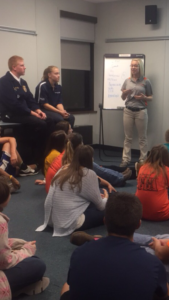What it means to be an agvocate
Winnebago Boone Farm Bureau
FREEPORT – “Agvocate” this word is not one you will find in Webster’s dictionary.
However, on March, 6 2012, Agri-Word WordPress.com defined this term to mean “similar to advocating for a cause-except, advocating for agricultural issues and the agriculture industry as a whole. Sometimes Facebooking and Tweeting by farmers and agriculturalists (other than news sources) promoting agriculture is agvocating.”
On Wednesday, Oct. 7, several FFA members gathered at Highland Community College for the Section One Leadership Training School and Greenhand Conference. FFA Chapters that attended included the last remaining FFA in Winnebago County and the Durand-Pecatonica-Winnebago FFA chapter.
Members that attended had an opportunity to attend several different workshops on how to build their leadership skills and expand their FFA career. But, one workshop that a few lucky freshmen were able to attend was put on by the Highland Community College Agriculture Club and focused on this term “agvocate”.
The students learned that the goals of all agvocates are to shine a positive light on agriculture, educate consumers, and most importantly, appropriately confront untrue theories and find fitting ways to correct them.
What does that mean? It means that being involved in student lead agriculture organizations, such as the FFA, 4-H, and Collegiate Farm Bureau, or as a post-secondary agriculture student, gives students the opportunity to take the time to answer consumers questions or discussmisconceptions of farming practices. It means that agriculturalists need to address the ads/pictures/videos on the internet and social media that misrepresent agriculture.
Agricultural producers work together to produce enough food and fiber to support the world. Currently the United States has the most abundant, affordable, and safe food supply when compared to other parts of the world. Producers are challenged with producing enough food to keep up with the growing population while improving farming practices to protect the environment and meet the needs of the consumers.
The FFA members who attended this workshop were asked three questions: How do you handle negative comments towards agriculture on social media? What do you do if you see an ad/picture/video that is putting out false information about the agriculture industry? When is it appropriate to correct/inform a consumer on the truth about agriculture?
After putting time and effort to come up with proper answers, students came to the following conclusions:
Keep Calm! As agriculturalists, they are passionate about their industry. Do not let anger interfere with passion.
Get the facts! Their job is to correctly inform consumers.
Honesty is the best policy. Explain the practices done on the farm and explain why they are put into place. Inform consumers that safety for their families, animals, the environment, and consumers is always their number one priority.
Finally, there is never a bad time! There is never a bad time to promote agriculture. They do not have to wear a blue FFA jacket or ride in a tractor to show their passion and devotion for the agriculture industry.
Agriculturalists are doing their very best to provide safe and affordable food for consumers. However, they may not be doing the best at making sure you, the consumer, know the true story of agriculture. So, if you have any questions about farming practices or the way agriculture operates, ask a farmer! Go to the source to find the truth.
“Like”Winnebago-Boone Farm Bureau on Facebook or visit www.winnebagoboonefarmbureau.org to find information on various aspects of the agriculture industry.



